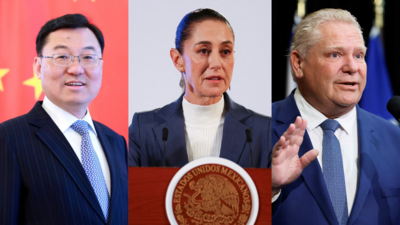
US President-elect Donald Trump has announced his intention to impose tariffs on imports from Mexico, Canada, and China, drawing swift condemnation from all three countries. Trump posted on his Truth Social platform that he will implement a 25% tariff on goods from Mexico and Canada and a 10% tariff on Chinese imports immediately after taking office on January 20.
Trump claims that the tariffs aim to curb the flow of fentanyl, illegal drugs, and migrants into the United States. However, critics argue the plan risks violating the US-Mexico-Canada Agreement (USMCA), a trade deal Trump himself negotiated and signed into law in 2020. Trump’s post said: “Both Mexico and Canada have the absolute right and power to easily solve this long-simmering problem”
“It is time for them to pay a very big price!” He also claimed in another post that China has not stopped the smuggling of fentanyl into the US.
Trump often uses trade threats to gain an upper hand in negotiations, but experts warn this strategy could backfire. It might increase inflation and disrupt supply chains in markets that are closely connected, as reported by USA Today.
China: ‘No one wins a trade war’
China was quick to respond to Trump’s tariff plan. Liu Pengyu, spokesperson for the Chinese embassy in Washington, dismissed Trump’s accusation that Beijing has failed to curb the smuggling of fentanyl precursors. “The idea of China knowingly allowing fentanyl precursors to flow into the United States runs completely counter to facts and reality,” Liu said. “No one will win a trade war or a tariff war,” he added.
Trump has often targeted China with trade policies, imposing tariffs on billions of dollars of Chinese goods during his first term. Experts believe his new plan could restart tensions and hurt the economy. While the tariffs focus on migration and drugs, some think the real goal is to limit China’s influence in North America.
Andrew Law, founder of The Mexico Brief, said, “Trump sees an opening to push China further out of America’s backyard. This is less a policy declaration than a move to stir up trouble among bickering allies.”
Canada: ‘Devastating for workers’
Canada, one of the United States’ largest trading partners, also raised concerns. Ontario Premier Doug Ford warned the tariffs would harm jobs and workers in both countries.
Oil is Canada’s top export to the United States, while the US heavily relies on Canadian-produced goods like auto parts. Trump’s proposed tariffs risk straining an economic relationship that, in 2022, saw trade between the two countries top $790 billion.
Ford added that industries like automobile manufacturing, which depend on seamless cross-border supply chains, would be particularly hard hit. For instance, components for cars assembled in the US often cross the border multiple times during production.
Experts warn that disrupting these ties could raise prices for consumers and put thousands of jobs at risk. Trump, however, seems firm, claiming tariffs will push Canada to tackle migration and drug issues.
Mexico: ‘Response to one tariff will be another’
Mexico, a key US trading partner with over $855 billion in annual trade, may be hit hardest by Trump’s tariffs. President Claudia Sheinbaum criticised the plan, saying it would harm both economies.
“The response to one tariff will be another until we put at risk companies that we share,” Sheinbaum said. She brought attention to the potential fallout for US firms like General Motors and Ford, which operate assembly plants in Mexico.
Sheinbaum emphasised her country’s efforts to address migration, citing a “holistic approach” that has reduced US border encounters by over 75% since last December. She also suggested that US drug issues, particularly the fentanyl crisis, are public health problems requiring domestic solutions.
Despite her criticism, Sheinbaum expressed willingness to engage in dialogue with the incoming Trump administration. “Why put a tax on them that will put them at risk? It’s not acceptable,” she said, calling for a collective approach to tackle shared challenges.